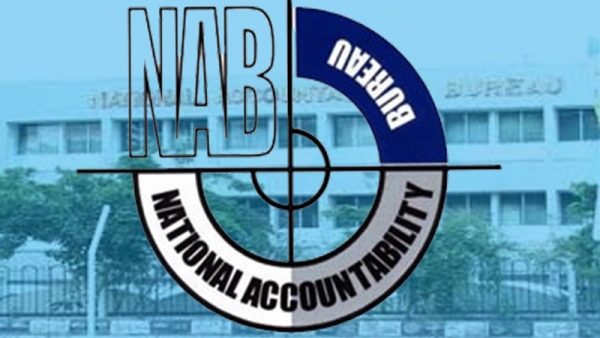The government is considering changing the powers of the National Accountability Bureau (NAB) on taking action against politicians and bureaucracy. In order to achieve this 31 amendments in the NAB ordinance are likely to be introduced in the near future.
According to sources, the government is likely to introduce certain amendments in NAB ordinance in the near future under which disqualification of the politicians on corruption cases will be for only five years instead of ten years and after passing the five years a convicted politician can also participate in the election process. Similarly, a politician can keep the public office till an end to the right of appeal in case he/she is awarded punishment in the corruption case. Likewise, NAB will have to get approval from the court before arresting an accused. Moreover, NAB will not be allowed to take action against the five years old transactions. Furthermore, after approval of the amendments in NAB ordinance, NAB will have to provide proof instead of the accused otherwise NAB will not be able to initiate an inquiry.
Sharing details of proposed amendments, sources also informed that NAB will not be able to take action against the Prime Minister (PM) and cabinet in the light of the committee’s decision. The long pending inquiries and under trial cases will be shifted to the concerned authorities. Also, NAB will not be able to register corruption cases against the politician and bureaucracy till the time the anti-corruption watchdog (NAB) does not prove the corruption against them.
The proposed amendments in NAB ordinance will be sent to the federal cabinet for consideration after consulting with the ruling alliance and Pakistan Tehreek-i-Insaf (PTI), said sources.
They added that PTI, Pakistan Muslim League-Nawaz and Pakistan People’s Party (PPP) will enjoy maximum benefit if the federal cabinet grants its approval to the proposed amendments in NAB ordinance.
“NAB will not have the powers to take action regarding the federal and provincial taxations, duties and levies after cabinet’s approval on the proposed amendments,, said the sources
Sources further said that the President will appoint the Prosecutor General after consulting the PM and opposition leader. They said that almost seven clauses of NAB ordinance will be removed and the amendments will be applicable from 1985 on under investigation cases and under trial cases. They said NAB will be bound to close an inquiry on corruption cases within six months. NAB officers will be awarded upto one year imprisonment and ten lakh worth fine in case he/she issues a public statement, said sources.
They added that NAB’s annual report will be placed before both upper and lower houses of parliament for discussion and consideration.
Available draft of the proposed amendments in National Accountability Ordinance, 1999 disclosed that this Act may be called the National Accountability (Amendment) Act, 2022 while it shall come into force at once and shall be deemed to have come into force from the 1st day of January 1985 and it will extend to the whole of Pakistan. Similarly, this Act shall apply to all persons, including those who are or have been in the service of Pakistan, wherever they may be. Likewise, the provisions of this Act shall not apply to transactions and persons related thereto if the subject matter thereof and/or loss to the Federal Government or a Provincial Government, as the case may be, is less than Pak Rupees Five Hundred Million and shall not, in any case, apply to
(a) transactions and matters pertaining to Federal or Provincial taxation, duties, levies or imposts, by whatever name called;
(b) matters, including incidental matters, which have been decided by, or fall within the jurisdiction of a regulatory body established under a Federal or Provincial law; or
(c) decisions of the Federal or Provincial Cabinet, ECC, CCI, ECNEC, or any other policy-making statutory body established under the Constitution,
(d) a transaction or subject matter not involving any property, funds or fiscal interest of the federal or provincial government.
(e) offences under Anti Money Laundering Act 2010.
The Prosecutor General shall be appointed by the President in consultation with the Leader of the House and the Leader of the Opposition in the National Assembly for a non- extendable term of three years and shall not be eligible for re-appointment. The Prosecutor General Accountability shall continue to hold office until his successor enters upon his office provided that such continuation in office shall not exceed sixty days. The Prosecutor General Accountability shall hold independent office on whole-time basis and shall neither hold any other office concurrently nor do any private law practice. Salary structure of the Prosecutor General Accountability shall commensurate with the Judge of the Supreme Court.
The Prosecutor General Accountability may resign from his office by writing under his hand addressed to the President.
The Prosecutor General Accountability shall not be removed from office except by the President on the grounds of removal of a Judge of the Supreme Court of Pakistan.
In case the Prosecutor General Accountability is absent or unable to perform the functions of his office due to any reason whatsoever, senior- most Additional Prosecutor General shall be notified to act as the Prosecutor General Accountability by the Chairman NAB.
As per proposed amendments in NAB ordinance, corruption and corrupt practices committed by companies or other body corporate- where a person committing an offence under this act is a company or other body corporate, every person who, at the time the offence was committed, was responsible for such an offence shall be guilty of the offence and liable to be proceeded against and be punished accordingly.
During the course of an inquiry or investigation any property of an accused moveable or immoveable, shall not be placed under any caution or restraint unless the same is sanctioned by the court of competent jurisdiction and the court is satisfied that upon there appearing there exist reasonable grounds for believing that the accused has committed an offence under this ordinance and the property in question is an outcome of the same and that the accused is likely to dispose of the whole or any part of the property.
“Provided, however, that NAB shall not conduct any inquiry or investigation or file any reference for an alleged offence after the passing of five years from the date of the transaction or act constituting the offence.”
Officers and staff of NAB except prosecutors shall be appointed by the Federal Public Service Commission in accordance with relevant provisions of the Federal Public Service Commission Ordinance, 1977, and shall be entitled to such salaries, allowances and other terms and conditions of service commensurate with their qualifications and experience, as may be prescribed by rules framed under Federal Public Service Commission Ordinance1977.
The provisions of the Civil Servants Act, 1973 (LXXI of 1973) shall apply to the persons appointed in or employed by the NAB.
The Chairman NAB, through Federal Public Service Commission, may appoint advisers, consultants and experts, on payment of such fee or remuneration as may be prescribed to assist him in performing the functions of the NAB and the discharge of his duties under this Ordinance.”
The Annual Report shall be placed before both Houses of Parliament for discussion and consideration.
No official of NAB, in any capacity, shall make any statement in public or to the media or leak any information regarding persons involved in any inquiry or investigation conducted by NAB until a reference has been filed against such persons; and whoever contravenes the provisions of section 33F shall be punished with imprisonment for a term which may extend to one year but shall not be less than one month in any case and with a fine of one million rupees.
Any person may file a complaint or bring a suit against any officer of NAB for physical torture or harassment caused by NAB officers or for falsely implicating any person, exaggerating or fabricating charges or evidence in the matter.
All orders, judgments and sentences passed under the National Accountability Ordinance, 1999 which have become final and in respect of which no proceedings or appeals are pending in any court including the High Court or the Supreme Court as on the date of promulgation of this Act shall, notwithstanding the provisions of this Act, be deemed to have been validly made and passed.
All enquiries, investigations, references, proceedings and appeals under or arising from the National AccountabilityOrdinance,1999 pending on the date of this Act, shall be dealt with in accordance with the provisions of the National Accountability Ordinance, 1999 as amended by this Act.

























The National Accountability Ordinance (NAO), 1999’s offense of corruption and corrupt practices will now carry a fine of Rs. 500 million, according to the new amendments. In order to be clear, the NAB will not have the authority to pursue corruption cases involving less than Rs500 million. The bill also revokes the president’s power to name judges for accountability courts after consulting with the chief justices of the high court.
CJP notes that NAB amendments were done by “incomplete assembly”, but says no law defines whether or not such a house can legislate.
We can gain a ton of new information from this website if we know how to investigate and absorb it.